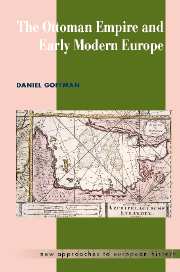Book contents
- Frontmatter
- Contents
- List of illustrations
- List of maps
- Preface
- Acknowledgements
- Note on usage
- Chronological table of events
- The Ottoman House through 1687
- 1 Introduction: Ottomancentrism and the West
- Part 1 State and society in the Ottoman world
- Part 2 The Ottoman Empire in the Mediterranean and European worlds
- Kubad in Venice
- 5 The Ottoman–Venetian association
- Kubad between worlds
- 6 Commerce and diasporas
- Kubad ransomed
- 7 A changing station in Europe
- 8 Conclusion: The Greater Western World
- Glossary
- Suggestions for further reading
- Index
- NEW APPROACHES TO EUROPEAN HISTORY
6 - Commerce and diasporas
from Part 2 - The Ottoman Empire in the Mediterranean and European worlds
Published online by Cambridge University Press: 05 June 2012
- Frontmatter
- Contents
- List of illustrations
- List of maps
- Preface
- Acknowledgements
- Note on usage
- Chronological table of events
- The Ottoman House through 1687
- 1 Introduction: Ottomancentrism and the West
- Part 1 State and society in the Ottoman world
- Part 2 The Ottoman Empire in the Mediterranean and European worlds
- Kubad in Venice
- 5 The Ottoman–Venetian association
- Kubad between worlds
- 6 Commerce and diasporas
- Kubad ransomed
- 7 A changing station in Europe
- 8 Conclusion: The Greater Western World
- Glossary
- Suggestions for further reading
- Index
- NEW APPROACHES TO EUROPEAN HISTORY
Summary
My Exalted Self commands the kadi and bey of Jerusalem: the bailo of Venice petitioned the Sublime Porte that those who visit Jerusalem from the subjects of the nobles of Venice should not be injured. Nor should any one of you interfere with the monks who live in the Church of the Holy Sepulchre. When they repair and renovate according to their old situation areas of that church which have fallen into ruin, they seek a command that it is in accordance with Venice's capitulations (ahdname and nişan). Such a decree is given to these Frankish monks.
In Pera they speak Turkish, Greek, Hebrew, Armenian, Arabic, Persian, Russian, Slavonian, Wallachian, German, Dutch, French, English, Italian, Hungarian; and, what is worse, there is ten of these languages spoke in my own family. My grooms are Arabs, my footmen, French, English and Germans, my Nurse an Armenian, my housemaids Russians, half a dozen other servants Greeks; my steward an Italian; my Janissaries Turks, that I live in the perpetual hearing of this medley of sounds, which produces a very extraordinary effect upon the people that are born here. They learn all these languages at the same time and without knowing any of them well enough to write or read in it.
One must turn to Ottoman history rather than western European history to explore how Venice and other western European states organized presences in the Levantine world, for the underlying design of Ottoman society did much to accommodate and make possible the development of commercial and diplomatic settlements in the empire.
- Type
- Chapter
- Information
- The Ottoman Empire and Early Modern Europe , pp. 169 - 188Publisher: Cambridge University PressPrint publication year: 2002

